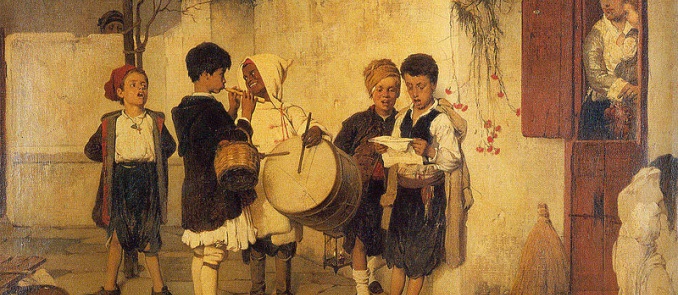The Greek “Calanda” Christmas Carols from antiquity to today
It is Christmas Eve today and children have already spread in the neighborhoods of every city, small or large, and at all corners of every village across the country from the early morning hours, in order to knock on the door of every household and sing the Greek ‘Calanda” Christmas carols...
Singing the Greek “Calanda” carols is a very old custom which stems from as far back as the antiquity. Although the word “Calanda” most possibly stems from the Latin word “calenda” which means "the beginning of the month" it is fairly certain that caroling in Greece has been a tradition since the ancient times and there are records of the Eiresioni carols which children would sing around their neighbourhood holding an olive or laurel branch decorated with red and white threads offering them to the homeowners. The Eiresioni song from the Homeric period is still heard today in the carols of the region of Thrace in the far north-eastern corner of Greece, with only a few small changes applied.
The first verse is as follows:
"In this house we came of the rich-landlord
May its doors open for the wealth to roll in
The wealth and happiness and desired peace should enter
And may its clay jugs fill with honey, wine and oil
And the kneading tub with rising dough."
Nowadays, children will go out in groups of two or more and knock on doors of the houses within their neighbourhood, singing carols accompanied by jingling metallic triangles or even accordions and harmonicas. After asking the landlord "shall we sing the carols for you?" and getting a positive answer, they will do so for a few minutes and to finish off they will wish "To the next year too” plus various wishes for health and happiness to whoever lives in the house. Years ago the homeowners offered children traditional Christmas sweets and pastries but nowadays it is mostly money in the form of change or even a euro note if they are very lucky!
In Greece, the “Calanda’ carols are sung on three occasions for the three eves of Christmas, the New Year and the Epiphany and they have a completely different content for each occasion.
We will here numerous versions of the Christmas Eve “Calanda” according to which region we are at for our Christmas holiday and based on the local traditions, preferences and of course the history of the area. The most common version of the Christmas Eve ‘Calanda” carols, translate as follows:
"Good morning land-lords
If it is your will
Christ was born
And I came to announce it to your household
Christ was born today
in the town of Bethlehem
the skies are rejoicing
all of nature is happy.
Inside the cave he was born
in the horse manger
The King of heaven
The creator of everything.
Many angels are singing hymns
Joy to the heavens
and this happening was discovered
from the believe of the shepherds
From Persia they are arriving
three prophets holding presents
a bright star is showing them the way
without disappearing at all from the sky.
To this house that we came today
we wish that not even one brick should ever crack
And to the landlord of the house
We wish him to live for many years."
The cover photo is of a painting by Nikiforos Litras titled "Calanda" and made in 1872 with oil on canvas. Today it belongs to a private collection.
Merry Christmas to one and all!



